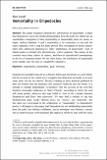Files in this item
Immortality in Empedocles
Item metadata
| dc.contributor.author | Long, Alex | |
| dc.date.accessioned | 2017-06-09T23:33:14Z | |
| dc.date.available | 2017-06-09T23:33:14Z | |
| dc.date.issued | 2017-01 | |
| dc.identifier.citation | Long , A 2017 , ' Immortality in Empedocles ' , Apeiron , vol. 50 , no. 1 , pp. 1-20 . https://doi.org/10.1515/apeiron-2015-0054 | en |
| dc.identifier.issn | 2156-7093 | |
| dc.identifier.other | PURE: 224643258 | |
| dc.identifier.other | PURE UUID: 2fd67f95-d6e1-4cb1-8dad-6f0c9fbde367 | |
| dc.identifier.other | ORCID: /0000-0001-5838-5490/work/60195619 | |
| dc.identifier.other | WOS: 000404754200001 | |
| dc.identifier.other | Scopus: 85078789613 | |
| dc.identifier.uri | https://hdl.handle.net/10023/10975 | |
| dc.description | Most of the work for the paper was undertaken in Toronto during a Leverhulme Research Fellowship. | en |
| dc.description.abstract | The paper examines Empedocles’ attributions of immortality. I argue that Empedocles does not withhold immortality from the gods but rather has an unorthodox conception of what immortality is. Immortality does not mean, or imply, endless duration. A god’s immortality is its continuity, as one and the same organism, over a long but finite period. This conception of divine immortality then influences Empedocles’ other attributions of immortality, each of which marks a contrast with discontinuity, real or apparent. The nature of this contrast varies from context to context, and there is considerable heterogeneity in the list of immortal items. On the other hand, the attribution of immortality never implies that the item is completely changeless. | |
| dc.language.iso | eng | |
| dc.relation.ispartof | Apeiron | en |
| dc.rights | Copyright © 2016, Walter de Gruyter GmbH. This work is made available online in accordance with the publisher’s policies. This is the final published version of the work, which was originally published at http://dx.doi.org/10.1515/apeiron-2015-0054 | en |
| dc.subject | Empedocles | en |
| dc.subject | Immortality | en |
| dc.subject | Gods | en |
| dc.subject | Theology | en |
| dc.subject | B Philosophy (General) | en |
| dc.subject | T-NDAS | en |
| dc.subject.lcc | B1 | en |
| dc.title | Immortality in Empedocles | en |
| dc.type | Journal article | en |
| dc.contributor.sponsor | The Leverhulme Trust | en |
| dc.description.version | Publisher PDF | en |
| dc.contributor.institution | University of St Andrews. School of Classics | en |
| dc.contributor.institution | University of St Andrews. Centre for the Study of Ancient Systems of Knowledge | en |
| dc.identifier.doi | https://doi.org/10.1515/apeiron-2015-0054 | |
| dc.description.status | Peer reviewed | en |
| dc.date.embargoedUntil | 2017-06-09 | |
| dc.identifier.grantnumber | RF-2014-019 | en |
This item appears in the following Collection(s)
Items in the St Andrews Research Repository are protected by copyright, with all rights reserved, unless otherwise indicated.

